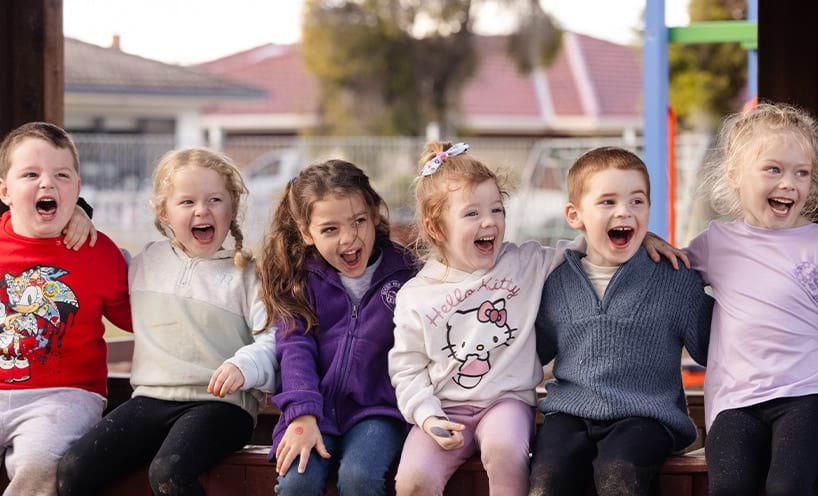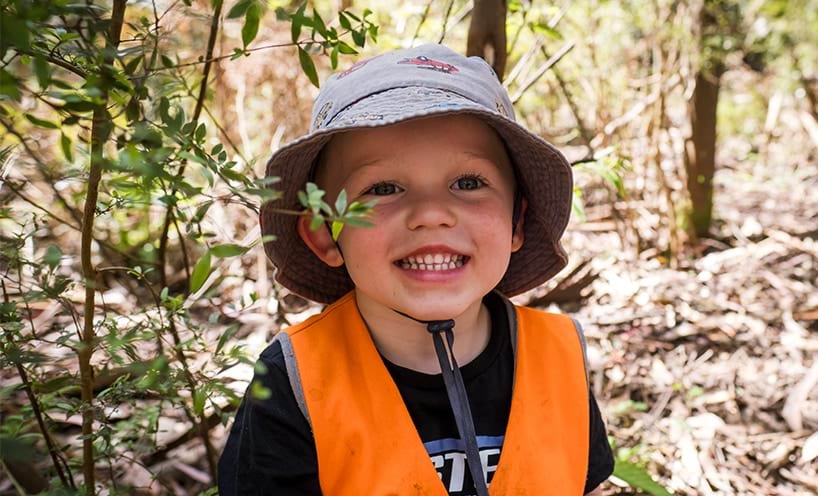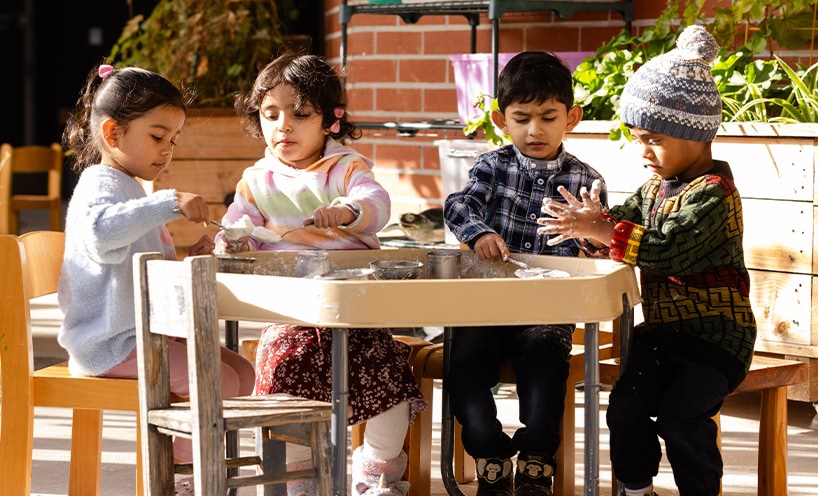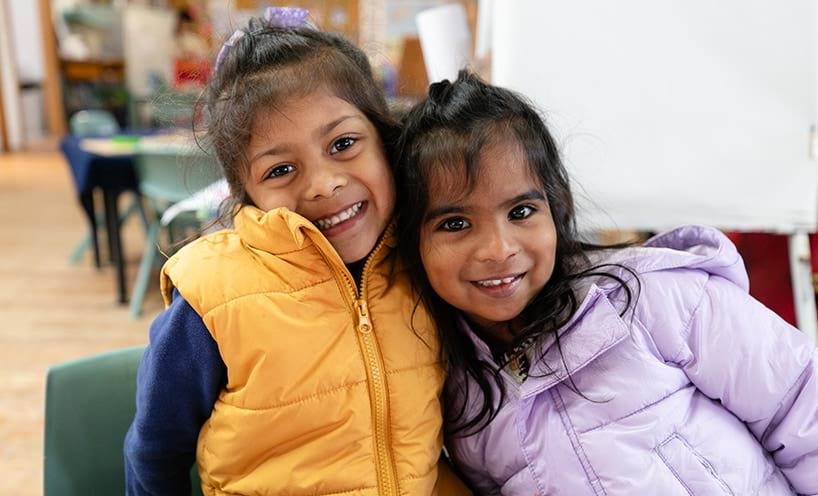- Published by:
- Department of Education
- Date:
- 3 Sep 2025
The Early Childhood Update e-newsletter is sent to early childhood teachers and workers, but is open to anyone interested in best practice in early years education and evidence-based teaching approaches. Subscribe here to receive the e-newsletter(opens in a new window).
Child safety updates
Actions Victoria is taking to make children safer.
Dear colleagues
At the end of August, two announcements were made that will change the way we work in the Victorian early childhood education and care (ECEC) sector: the Victorian Government’s response to the Rapid Child Safety Review and key outcomes from the Education Ministers Meeting. The actions arising from these announcements will strengthen the ECEC system, and we are now working to implement these important reforms.
On Friday 22 August 2025, state and territory education ministers and the Commonwealth Government agreed on national actions to ensure child safety in ECEC settings.
These actions include:
- amending the National Law to make the safety, rights and best interests of children the paramount consideration in decision making
- establishing a National Worker register
- increasing penalties for offences
- a trial of CCTV in ECEC settings to begin by November 2025
- implementing national mandated child safety training
- implementing national restrictions on the use of personal devices in ECEC settings
- reviewing worker-to-child ratio practices
- considering the establishment of a National Early Childhood Reform Commission.
This delivered on a number of the recommendations in Victoria’s Rapid Child Safety Review.
The Victorian Government announced on Wednesday 20 August 2025 that it will accept all 22 of the Review’s recommendations, which included:
- amending the Working With Children Check (WWCC) scheme to allow consideration of unsubstantiated allegations and intelligence to inform decisions whether to grant, suspend or cancel a WWCC clearance
- establishing a new and strengthened independent Early Childhood Education and Care regulator that will more than double the frequency of compliance checks, visiting providers unannounced at least once every 12 months
- strengthening the Social Services Regulator by giving it new powers to make it responsible for Working With Children Checks and the Reportable Conduct Scheme
- new requirements for best-practice recruitment and clear guidance about how to report concerns, including advice for parents and promotion of the complaints and enquiry hotline.
The Department of Education will continue to provide more information on the next steps related to both the national and state-level changes as soon as they are available.
In the meantime, we acknowledge services that have acted to register their workforce with the new Victorian Early Childhood Workforce Register. This is a critical part of creating systemic change and will help build the foundations for a comprehensive national worker registration system. Any services experiencing difficulties with this action should contact the Arrival Implementation team by email: arrival.implementation@education.vic.gov.au.
We also thank services that are following the guidance on personal device restrictions and encourage all providers to confirm that they have updated their policies and procedures by Friday 26 September 2025. You can find more information on this at the Child safe practices for digital technologies and personal electronic devices website.
We would also like to remind professionals across the sector that there is phone line assistance to raise issues and seek support.
- Anyone with concerns about the safety of children in early childhood services should call QARD on 1300 307 415. Reports can be made anonymously.
- The Early Childhood Wellbeing Support Program provides free counselling for early childhood education and care staff. The service is delivered by TELUS Health. Counselling is available 24 hours a day, 7 days a week. Support is available via phone, in-person and live chat. For an appointment call 1300 360 364 or to start an SMS conversation with a clinician, text 0480 032 310. More information is available on the department’s website.
Thank you, as always, for your professionalism, skill and commitment to children’s outcomes, and for your diligence in creating lasting and meaningful safety changes for the sector and Victorian children and families.
Bronwen FitzGerald
Deputy Secretary
Early Childhood Education
Arrival — update on kindergarten attendance data collection
Sessional services are now collecting and reporting attendance data in Arrival.
Thank you to all the sessional services who have been working through the transition from paper-based collection methods to using Arrival for digital attendance data collection.
Almost 1,000 people attended the 9 information sessions we held to support this transition. We want to acknowledge the effort from participants demonstrating an ongoing commitment to implement digital attendance data collection through Arrival.
Services are providing useful and constructive feedback about their transition experiences on a range of features, including the sign in and sign out functionality. In response to this feedback, we are working through identified issues and will provide further advice as it becomes available.
In the meantime, services should continue using paper-based methods for attendance.
Services using third party software for attendance
The department is continuing to work with kindergarten management software (KMS) providers that express an interest in integrating with Arrival and can meet the associated security requirements.
The department has signed data-sharing agreements with several KMS providers to date, including Kidsoft, Enrol Now, Xplor/Qikkids, Xap, Kinderloop and OWNA.
Where there is a data-sharing agreement in place, attendance data will flow directly from the KMS into Arrival.
We will continue to send email updates to services that are using a third-party KMS to record attendance data.
Updated guidance and support
Updated guidance and support for using Arrival is available through the ‘Help’ link at the top right-hand corner of your Arrival system screen.
For more information and resources to support families using Arrival for sign in and sign out, refer to: Arrival: attendance data collection(opens in a new window).
For technical support when using the system, services should contact the Arrival Helpdesk:
Find out more
For further enquiries about using or accessing Arrival, contact the Arrival Implementation team by email: arrival.implementation@education.vic.gov.au(opens in a new window)
Digital registration cards are here
Learn how digital teacher registration is making it easier for early childhood teachers to prove their registration status from their smartphone.
The Victorian Institute of Teaching (VIT) has started phasing out physical registration cards and is moving to a digital solution.
The new digital VIT registration card is always up to date, pulling live data from VIT’s registration system.
The VIT has engaged Service Victoria to develop and host the new digital VIT registration card on the Service Victoria app, providing employers and teachers with convenient access to proof of registration.
Using the same digital wallet that stores Victorian digital driver licences, teachers can easily retrieve and show their registration details via their smart phone.
Employers can scan a QR code and instantly verify a teacher’s status.
The register of teachers, Employer portal and digital registration cards are all linked to VIT’s teacher registration system and will be updated immediately upon a change in registration, making it a safe and accurate way to prove an early childhood teacher’s registration status.
Learn more about the benefits of digital registration cards.
How to access your new digital card
New applicants who are granted early childhood teacher registration are being issued with a digital card once their application has been approved.
Existing early childhood teachers will be issued with a digital card once their 2025-26 annual registration application has been approved. More information on accessing your digital card is available via your MyVIT account.
If you were issued with a physical registration card during the 2024-25 annual registration period, you can use this card to verify your registration until Tuesday 30 September 2025. You will be issued with a digital VIT registration card following the approval of your 2025-26 annual registration application.
Find out more
For more information and resources about the transition to digital registration cards, including a support pack, user guide and FAQs, visit the VIT website.
Giving children the best start in their education journey
Celebrating educators on Early Childhood Educators’ Day.
Today we celebrate Early Childhood Educators’ Day, a time to recognise the important work early childhood educators do to support children’s wellbeing, learning and development.
For many early childhood educators, the commitment to supporting children’s development starts early.
Navdeep Kaur cemented her love for the profession during her Certificate III in Early Childhood Education and Care placement.
‘I realised how much I enjoyed working with children and supporting their growth. I felt a strong sense of purpose knowing that I was part of the team around each child,’ she said.
Navdeep’s passion has grown over her 3 years working as an educator.
‘The most rewarding part is watching children grow and develop — seeing them go from the baby room to kindergarten, becoming confident and independent,’ she said.
Financial support provided by the Victorian Government’s Certificate III Upskill Support Program helped her reach her goal of becoming a Diploma-qualified educator.
‘It lifted the financial burden so I could focus on my studies while undertaking my diploma. I knew I could take time off work without worrying about costs, which helped me progress in my career,’ she said.
Memorable moments
For Navdeep, every day brings a new opportunity to positively impact a child’s life.
One moment that stands out for her is working with a young girl with autism.
‘I started teaching her a poem and she learned it very quickly. This encouraged me to teach her more, and actions to go with them,’ Navdeep said.
‘Over time, she mastered them and started to always come to me for comfort. Building that trust and connection with her is something I will always remember.’
Lifelong learning journey
Audrey Lockwood (pictured), an early childhood educator at Gowrie Victoria in Carlton North, was inspired to enter the profession during her high school years, when she undertook a vocational education and training subject in early childhood education as part of her studies.
‘During my placement, I was amazed by the skill and expertise of the educators in the room,’ Audrey said.
This sparked her passion for the profession and interest in further study. After completing her Certificate III in Early Childhood Education and Care in 2022, Audrey received financial support from the Victorian Government to undertake the diploma, which she completed in March this year.
‘The best part of being an educator is seeing those small steps in a child's development that lead to big leaps. One week, a child can’t catch a ball, and the next, they can. Those moments make all the difference,’ Audrey said.
Despite the demands that come with the job, Audrey offers valuable advice for those considering a career in early childhood education.
‘It’s such a rewarding career offering lots of opportunity for growth. You may have tough days, but the impact you make on children’s lives is invaluable. It’s a lifelong learning journey,’ she said.
Share stories of your educators
If you have a story you’d like to share about an early childhood educator at your service and the impact of their work, reach out to our communications team by email: ec.portfolio.communications@education.vic.gov.au
Find out more
For more information about scholarships and incentives to study and work in early childhood education, refer to: Financial support to study and work in early childhood education.
Streamlining the Kindergarten Inclusion Support application process
The next phase of improvements to digitise applications is underway.
The inclusion of children with additional needs in kindergarten programs remains a core priority for the department.
In the first phase of improvements to the Kindergarten Inclusion Support(opens in a new window) (KIS) program, a new centralised submission and assessment process, managed by Australian Healthcare Associates (AHA), was introduced last year.
This resulted in better response times for application outcomes despite a more than 30% increase in demand for the program.
The next phase of the improvements project, to digitise KIS applications, is well underway.
This digitisation responds to feedback from the early childhood sector to streamline the process of completing KIS applications and is aimed at reducing the administrative burden on early childhood staff.
How will I access the new form?
The digital form can be accessed the week beginning Monday 6 October 2025 from the current KIS application submission site. This will replace the manual form and will be used for all KIS applications that are submitted throughout the year and into the future.
From that date, any staff member in a kindergarten service seeking to lodge an application will need to create an account. These accounts will require individual email addresses for each user, in addition to multi-factor authentication.
There is no change in the submission process for KIS applications submitted before Monday 6 October 2025. It is recommended that applications for 2026 be submitted via the digital form from Term 4 this year.
What guidance and support will be available?
Services can contact their local KIS provider for further advice and support. These providers will also deliver workshops on the new process in the weeks leading up to the end of Term 3.
The KIS application support team can be contacted on 1300 564 149 to help with the submission process.
Find out more
For more information on the KIS program, including the guidelines and list of KIS providers in your area, please visit the Kindergarten Inclusion Support webpage(opens in a new window).
We also offer a range of other inclusion supports, including:
Applications open for Bush Kinder grants
Apply for a grant to establish a new or enhance an existing bush kinder program at your service. Applications close 18 September 2025.
The Victorian Government is investing $3.6 million over 4 years to support kindergarten services to deliver outdoor learning programs, giving children more opportunities to play outside, connect with nature and learn.
Eligible early childhood services are invited to apply for a one-off $6,000 grant to help establish a new or enhance an existing bush kinder program for delivery in 2026.
Now in its third year, the Bush Kinder Grants program awards up to 150 grants each year to help funded kindergarten services run nature programs at local parks, bushland and beaches.
For more information and to apply, refer to: Bush Kinder Grants Program. Applications close Thursday 18 September 2025.
Find out more
For further enquiries about the grants, contact the bush kinder grants team by email: bush.kinder.grants@education.vic.gov.au
For more information about how to set up a bush kinder program, refer to: Bush kinders.
New resources to help you connect with Early Childhood Language Services
Use our resource pack to access interpreting services and support families who speak a language other than English.
We have developed new resources to help you access our free interpreting and translation service and register with the service provider All Graduates.
The resources are designed to help you connect with interpreters and support families to participate in conversations and important decisions about their child’s wellbeing, learning and development.
All funded kindergarten services in Victoria can access the free Early Childhood Language Services. You can request an on-site, telephone or video interpreter to help communicate with parents or carers who speak a language other than English or use Auslan.
Early Childhood Language Services help to bridge communication gaps by ensuring all families receive the same information and opportunities to engage and participate in early childhood programs.
How to access the resource pack and what’s included
Your service will receive the Early Childhood Language Services resource pack through Australia Post from Thursday 4 September 2025 and an email with further advice. The pack includes:
- a welcome sign to display at your service and guidance on creating culturally safe and inclusive learning spaces
- information on how to register and create a user account to use the free interpreting and translation services
- a ‘speak with us in your language’ poster and card inviting families to identify their preferred language
- a quick reference guide for how to request an interpreter
- a guide to working with an interpreter in early childhood settings
- information on fka Children’s Services eLearning series to support communication with families about enrolment, orientation and ongoing participation.
There is high demand for interpreters in education and health services across Victoria. When booking an interpreter, please be flexible as an interpreter may not always be available right away.
Find out more
For more information refer to:
For further enquiries, contact All Graduates by email: de.enquiries@allgraduates.com.au or the department’s Partnerships and Multicultural Inclusion team: early.years.cald.programs@education.vic.gov.au
Respectful Relationships professional learning for early childhood educators
Build your capacity to support children to develop resilience, confidence and respectful relationships.
The Respectful Relationships initiative is offering free professional learning for early childhood educators (bachelor, diploma, or certificate III qualified) in Victorian Government-funded kindergarten programs.
The online learning program will run from Monday 13 October to Friday 7 November 2025. It aims to strengthen the capacity of early childhood educators to:
- promote respectful relationships, positive attitudes and behaviours within their teaching approach, to enable children to build healthy relationships, resilience and confidence
- understand the role of gender equality in the prevention of family violence, and learn practical strategies for promoting gender equality in their teaching practice
- recognise and respond to family violence and build support networks.
About the professional learning program
We developed the professional learning program in collaboration with world-leading experts from Monash University. The program aligns with the Victorian Early Years Learning and Development Framework and the National Quality Standard.
The department is offering a financial contribution to services that need backfill for staff who join this training.
Program details
Dates: Monday 13 October to Friday 7 November 2025
Format: online (one full-day workshop and one 2-hour, self-paced learning module)
Cost: free.
Find out more
For more information and to register, refer to Respectful Relationships in early childhood. Registrations close Friday 7 November 2025, or when the program is fully booked.
For further enquiries, contact the Respectful Relationships team by email: respectful.relationships@education.vic.gov.au
Applications open for provisionally registered teacher grants
Approved providers can apply for grants to support provisionally registered teachers to move to full registration. Applications close 19 September 2025.
The Provisionally Registered Teacher (PRT) Grants Program helps approved providers to support provisionally registered early childhood teachers to move to full registration with the Victorian Institute of Teaching.
Moving from provisional to full registration is an important step in a teacher’s career and demonstrates their proficiency against the Australian Professional Standards for Teachers.
Applications are open for round one of the 2025 –26 program.
Approved providers can apply for funding of $3,370.40 (excl. GST) per PRT. This is an increase from $2,872 (excl. GST) in 2024–25. The increased funding means more support for professional learning, coaching and mentoring to help your PRTs achieve full registration.
Applications must be submitted through the PRT Grants Program Portal by an authorised representative of an early childhood service with a funded kindergarten program.
Before submitting the application, authorised representatives must:
- discuss the application with the PRT they are seeking funding for
- provide the PRT with the privacy statement, available in the PRT Grants Program Portal.
Applications close 5 pm Friday 19 September 2025.
Find out more
For more information, refer to Early Childhood Provisionally Registered Teacher (PRT) Grants Program or email prt.grants.program@education.vic.gov.au







